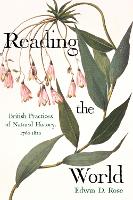


|
|
|
books
| book details |
Reading the World: British Practices of Natural History, 1760-1820
By (author) Edwin David Rose

|
This book is currently unavailable. Enquire to check if we can source a used copy
|
| book description |
In the eighteenth and nineteenth centuries—a period that marked the emergence of a global modernity—educated landowners, or “gentlemen,†dominated the development of British natural history, utilizing networks of trade and empire to inventory nature and understand events across the world. Specimens, ranging from a Welsh bittern to the plants of Botany Bay, were collected, recorded, and classified, while books were produced in London and copies distributed and used across Britain, Continental Europe, the Pacific, Asia, and the Americas. Natural history connected a diverse range of individuals, from European landowners to Polynesian priests, incorporating, distributing, synthesizing, and appropriating information collected on a global scale._x000D_ _x000D_ In Reading the World, Edwin D. Rose positions books, natural history specimens, and people in a close cycle of literary production and consumption. His book reveals new aspects of scientific practice and the specific roles of individuals employed to collect, synthesize, and distribute knowledge—reevaluating Joseph Banks’s and Daniel Solander’s investigations during James Cook’s Endeavour voyage to the Pacific. Uncovering the range of skills involved in knowledge production, Rose expands our understanding of natural history as a cyclical process, from the initial collection and identification of specimens to the formal publication of descriptions to the eventual printing of sources.
| product details |
Normally shipped |
Publisher | University of Pittsburgh Press
Published date | 30 Sep 2025
Language |
Format | Paperback / softback
Pages | 408
Dimensions | 229 x 152 x 0mm (L x W x H)
Weight | 0g
ISBN | 978-0-8229-6770-5
Readership Age |
BISAC | science / history
| other options |
|
|
|
To view the items in your trolley please sign in.
| sign in |
|
|
|
| specials |
|
|
|
This first comprehensive biography of Cecil Rhodes in a generation illuminates Rhodes’s vision for the expansion of imperialism in southern Africa, connecting politics and industry to internal development, and examines how this fueled a lasting, white-dominated colonial society.
|
Let's stare the future down and, instead of fearing AI, become solutionists.
|
|
|
|